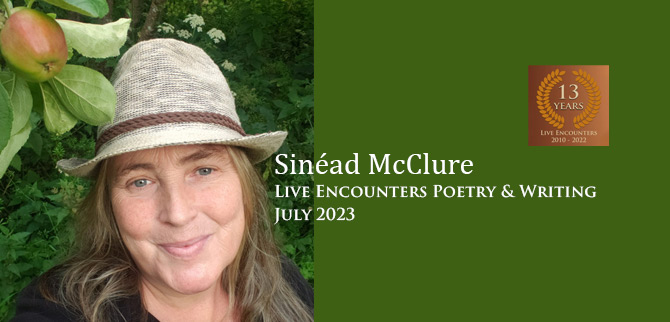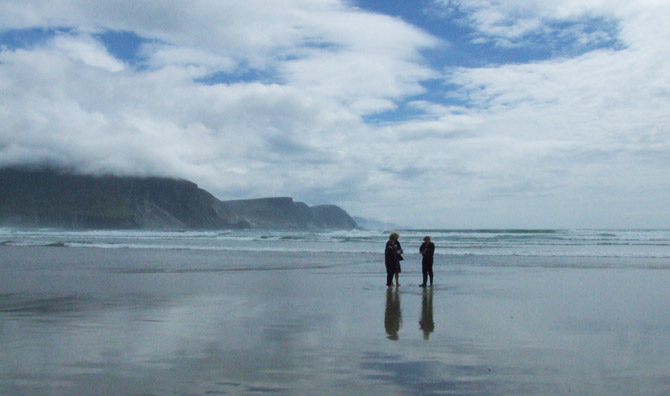
Download PDF Here
Live Encounters Poetry & Writing July 2023
Writing the Personal—Louis MacNeice and Me by Sinéad McClure.
This work was first written by Sinéad McClure as an Essay for the Creative Specialism Practice Module of the MA in Creative Practice at ATU Sligo (C) 2023.

My first experience of being truly present with a poem was Louis MacNeice’s The Strand[i]. I was standing in the Atlantic Ocean on Keel Beach in Achill up to my knees in surf recording a guest for a radio show. This guest insisted that he read this poem while we stood in the water. There, trying to balance myself and my microphone with white foam swishing at my feet, I got it. I felt it.
‘White Tintoretto clouds beneath my naked feet,
This mirror of wet sand imputes a lasting mood
To island truancies; my steps repeat’[ii]
While MacNeice didn’t visit Achill until he left school, as a child he built a picture in his mind about the landscape of the West of Ireland. These places became almost fantastical, a make-believe of childhood, a place of freedom handed down from family stories.[iii]
Louis Mac Neice was born in Belfast in 1907; both his parents came from the West of Ireland. When Louis was a small boy the family moved to Carrickfergus where his father became a Church of England Rector. In some of his work you can feel a sense of displacement from the orthodox, perhaps a hangover from the close proximity to the religion he grew up with. It is believed that MacNeice did not have much time for organised religion, but he kept an open mind.[iv]
My childhood was spent roaming the beach near my Dublin home. I played truant every Sunday preferring to walk the strand to enduring mass, I also don’t have much time for the church. On the face of it, MacNeice and I should have little in common. But as I have grown into my writing I do find a kinship with this poet. I became interested in poetry at a very young age, my eldest sisters copy of Window on Poetry[v], is still a treasured possession, in all its red and gold hardback glory! I have read widely since but few poets have offered me such a vivid reading experience as MacNeice, lines that have stayed with me ever since;
‘The room was suddenly rich and the great bay-window was
Spawning snow and pink roses against it
Soundlessly, collateral and incompatible;
World is suddener than we fancy it.’[vi]
‘Snow’ is an exceptionally clean, visually engaging poem, filled with a quiet brightness, a light you can only expect from a scene that is silently filling up with snow. In this brightness there lurks something far darker, a vision of a changing world, a fear that in the quietness something will shake the equilibrium. MacNeice wrote the personal but used his perspective to come to terms with and to offer the reader contemplation on life and death. He often dealt with much larger themes than could be seen at first glance. So for me his poetry is a layering, an unmasking, I can read and reread and discover new things each time.
MacNeice was a witness, he made comment, he was a natural reporter—but ironically as the son of a rector, he never proselytised.
When I first read Snow, I was amazed by the audacity of the word ‘suddener’ like something a child would say, so immediate and convincing to be perfectly true. MacNeice’s work spoke to me on a different level my immersion in place, memory, and also metaphysics, the otherworld, something intangible.
In his book Louis MacNeice: In a Between World[vii], Christopher J. Fauske refers to Derek Mahon, Seamus Heaney, and Michael Longley and their shared admiration for MacNeice. He recalls that before each of them became published poets they visited MacNeice’s grave to try and elicit an elegy to the man they all admired. Longley wrote;
‘When the three of us were next together Mahon took from his pocket ‘In Carrowdore Churchyard’ and read it aloud. Heaney started to recite his poem, then crumpled it up. I wisely decided then and there not to make the attempt.’[viii]
This anecdote from Longley says more about the collective appreciation for Louis MacNeice than Derek Mahon’s sublime lament. The three poets wanted to write a fitting elegy, it did not matter which one of them wrote it, there were no egos. I am not sure if this is a trait of all writers, but I believe poets often question the strength of new work. This honesty from Longley shows camaraderie with fellow poets which I think MacNeice would have approved of.
I met Michael Longley in 2001 recording a piece for Lyric FM’s art show he took us to the Lisburn Road in Belfast and read his poem The Ice Cream Man. The poem was poignant, and soul raking, a heart cry from the boglands which was lifted high above the weekday traffic. ‘Soundlessly, collateral, and incompatible’[ix] indeed.
Louis MacNeice and I have been having a bit of a revival since I started my MA in Creative Practice at ATU Sligo. It was his poem “Prayer Before Birth”[x] which I turned to, to inspire my first creative piece while working through my masters.
‘We never grew, don’t speak us
No whale-oak strength
No alder-handed coolness
no leaves to call out spring
or rot to fall in autumn
nothing to tumble into’[xi]
It is more than just inspiration, and hard to contextualise these things we find to influence us when we read poetry that strikes a chord within us. With MacNeice I share common themes, ecology, land, spirituality but in an otherworldly sense, lapsed, in a religious sense, and we both have written from a quiet place, so as not to disturb, more to endure;
Changing the world was never a task MacNeice thought appropriate to himself, but he distrusted the order into which he had been born and in which he lived. He wanted not to take it apart but to enliven and enrich it with the human values of warmth, decency and integrity.’[xii]
I am beginning to see MacNeice as a silent companion in my own work, someone I am not afraid to learn from. He wrote many ecologues, most famously his Ecologue From Iceland;
‘ G: Too many people. My memory will go
Lose itself in the hordes of modern people.’[xiii]
These dialogue poems have become a bit of a revelation for me as I continue my creative practice and concentrate on writing an Epic poem for my dissertation. I am using some of these dialogue techniques to converse with people in my poems. I am dwelling on loss, and on finding characters revealed through noticing. MacNeice wrote radio drama, and I spent the last fourteen years doing the same. I could never parse the two, deciding that radio drama is a whole different realm and genre to poetry. In poetry, I felt I wasn’t offering myself the same space, the same broad sweep of imagination. That is until I started to read MacNeice’s ecologues and there it was, where drama meets poetry on the page.
‘In August, MacNeice went to Yorkshire with a recording engineer to get exactly right the sounds from beneath the mountain he needed for Persons from Porlock.
It is easy to see the hand of fate in the viral pneumonia he apparently contracted while wet, cold and tired throughout the expedition.’[xiv]
Louis MacNeice died shortly after contracting pneumonia while working to collect ambient sounds for a radio play in 1963 he was 55 years of age. I turn 55 this year.
Then there’s the sea, the rivers, the lakes, land and forests of the West of Ireland that I too heard about as a child, places of make-believe, and exploration. I roam these places now to inspire poems. These same places perhaps that MacNeice spoke of in his Nature Notes[xv]. The same places that make me ‘fall in love, yet fill/The primroseless roseless, gaps’[xvi]
[i] Louis MacNeice, The Strand Selected Poems edited by Michael Longley Faber and Faber 1988(p.105)
[ii] Louis MacNeice, The Strand Selected Poems edited by Michael Longley Faber and Faber 1988 ( p.105)
[iii] Michael Longley Introduction Louis MacNeice, Selected Poems, Faber and Faber 1988 (p.xv) (paraphrased)
[iv] Michael Longley Introduction Louis MacNeice, Selected Poems, Faber and Faber 1988 (p.xxv) (paraphrased)
[v] W.J. Steele, Window on Poetry, Fallons, 1959
[vi] Louis MacNeice, Snow, Selected Poems edited by Michael Longley Faber and Faber 1988(p.23)
[vii] Fauske, Christopher J. Louis MacNeice: In a Between World. Irish Academic Press, 2016.(p6)
[viii] Michael Longley, ‘Introduction’, Louis MacNeice: Poems Selected by Michael Longley (London: Faber, 2001), pp.vii–xii (p.xi)Fauske, Christopher J. Louis MacNeice : In a Between World. Irish Academic Press, 2016
[ix] Louis MacNeice, Snow, Selected Works, Faber and Faber 1988, p.23
[x] Louis MacNeice, Prayer Before Birth, Louis MacNeice Selected Poems, Faber & Faber, 1988 (p93)
[xi] Sinéad McClure Poem Before Tree Extract Created during MA in Creative Practice
[xii] Fauske, Christopher J. Louis MacNeice : In a Between World. Irish Academic Press, 2016.(p4)
[xiii] Louis MacNeice, Ecologue From Iceland, Louis MacNeice Selected Poems, Faber & Faber, 1988 (p27)
[xiv] Fauske, Christopher J. Louis MacNeice: In a Between World. Irish Academic Press, 2016.(p139)
[xv] Louis MacNeice, Nature Notes, Louis MacNeice Selected Poems, Faber & Faber, 1988 (p134)
[xvi] Louis MacNeice, Nature Notes ‘Dandelions’ Louis MacNeice Selected Poems, Faber & Faber, 1988 (p134)
© Sinéad McClure
Sinéad McClure’s writing is published on radio, and in anthologies, magazines and online including; The Honest Ulsterman, The Stinging Fly, Southword, Live Encounters, Poethead, Drawn to the Light, The Cormorant, Dodging the Rain, A New Ulster, StepAway Magazine, Sonder Magazine and many other fine publications. In 2022 Sinéad was the winner of The Cathal Búi Poetry Prize (English Language Section) with her poem On the Anatomy of Birds. She was the 2022 recipient of the Roscommon Bursary Award for her first solo chapbook The Word According to Crow. Along with her collaborator Cáit O’ Neill McCullagh their chapbook The songs I sing are sisters was published by Dreich in Scotland.

